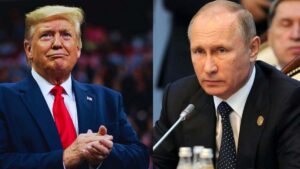New Delhi, August 2025 – The trade relations between the US and India have once again become tense. President Donald Trump has announced to impose tariffs of up to 50% on Indian imports. This decision has been met with sharp reactions not only in India but also in the global strategic community.
But one name has emerged prominently among all these – F. Crystal Kaur, who is a strategic advisor to NATO. She termed this policy of Trump as a “power play style”, but also said that “it will not work on India”.
What is the whole matter?
Donald Trump says that India has weakened America’s international strategy by buying oil from Russia. That is why he has threatened to impose heavy tariffs on India. This is a kind of “Economic Sanction Light” – not a direct ban, but a step that shocks trade.
Crystal Kaur’s blunt words: This ‘power play’ will not work on India
F. Crystal Kaur said,
“Donald Trump’s strategy may work on America’s smaller trading partners, but not on an emerging global power like India.”
She argued that India is no longer just a part of global politics, but has become a policy-making player. In such a situation, any kind of economic pressure will fail to bow down to India.
State of India: Test of Aatmanirbhar Bharat
India has, over the years, been building its foreign policy on a multilateral basis. Strong defence ties with the US, energy imports from Russia, and technology cooperation with Europe — India has been proactive on all fronts.
The Indian government has called this new tariff policy “unreasonable and unprofessional”. A foreign ministry official, speaking on condition of anonymity, said:
“India is not dependent on any one pole. We are in favour of an independent foreign policy. America’s tariff pressure will not change our policy.”
Differences within the US
Crystal Kaur is not the only one who is questioning Trump’s policy. Many experts within America are considering this move as “diplomatic suicide”.
- Harvard University professor of international affairs Daniel Ford says:
“By engaging with India, the US is making China stronger.”
- Economic analysts like Peter Schiff believe that if the dollar weakens, American consumers will be hit by inflation
Power play or political stunt?
Experts also believe that this tariff move is completely part of Trump’s election agenda. Under the “America First” agenda, Trump wants to send a message to his voters that he takes a tough stance on foreign markets. But this policy may cause “long-term strategic loss” for “short-term political gain”.
What should be India’s response?
India has two options:
- Challenge the US tariff policy on the WTO platform.
- Deepen cooperation with other strategic partners besides the US such as Russia, France, Japan and UAE.
India is already working on projects like “IMEC” (India-Middle East-Europe Corridor), which will further strengthen its global reach.
Has the crisis of global leadership deepened?
Krystal Kaur’s comment – “This won’t work on India” – is not just about one country, but it points to a new global trend. Now even small countries are standing up to big powers for their sovereignty. Countries like India, which are strategically, economically and demographically strong, are no longer afraid of the “threat of tariff”
Conclusion: A test of trust, not trade
Donald Trump’s tariff policy is no ordinary decision — it is a reflection of America’s global thinking. But as emerging powers like India spread their wings, such pressure will not work.
Krystal Kaur’s warning — “This strategy will not work on India” — not only gives direction to US policymakers, but also presents India as a self-confident nation.
—End— More










